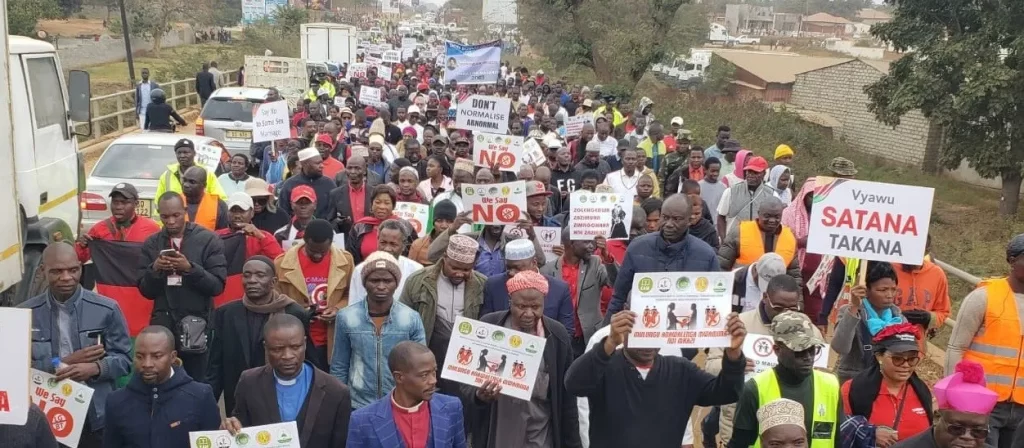The legality of homosexuality continues to be a topic of interest and actions from those that are pro and against continue to make way to the public domain. As the LGBTQ cases brought by a Dutch national and transgender woman from Malawi who are challenging the constitutionality of the country’s laws on homosexuality are in progress, the local Catholic Church backed by other religious groups organized mass demonstrations. These were held simultaneously in the major cities of Lilongwe, Blantyre, Mzuzu, and Zomba. Other districts such as Mchinji, Phalombe, and Dedza also held demonstrations.
Our recent interactions with a number of religious leaders, local chiefs, and the LGBTI people to share their views about these demonstrations, have both questioned the timing, and basis as well as uncovered some inconsistencies in the relevance of the protests. The demonstrations were characterised by hurtful speech, threats, and mockery against the LGBTI people.
“Our Job as a church is to preach about salvation and our focus should not be on changing the law. We should not interfere with things which were already prophesied in the bible but seek guidance from God through prayer,” emphasised Pastor Malunga.
He further pointed out that even if Jesus Christ was still on earth, he could not have joined the protests because he is the prince of peace. He added that if he had come during the day of protests, he would find that most of the protestants were also sinners themselves. Malunga stresses that the only distinguishing fact would have been that the LGBTI have their sin made public whilst the demonstrators have their sins hidden.
“It is very possible to lose the true essence of our calling if we toss away and disregard these people because we were called to save the lost. Love and respect for humanity should always be our guide to bring back these people to the heart of God,” concurred Pastor Msiska.
On the contrary, Sheikh Nkhalango is of the view that if Prophet Mohammed was to come that day, he would have sided with the protestants because they were against the law that Satan wanted to introduce to the world. He adds that the duty of a religious leader is to preach love by guiding people not to abide by nor allow laws that promote sin which invokes God’s anger as stipulated in both the Quran and the Bible.
“The purpose of the demonstrations was to ask God to convict the hearts of those deciding on the matter in the courts not to allow same-sex unions because they originate from the devil,” elaborated Nkhalango.
Another religious leader from Phalombe stressed that the protests were organised not to hurt others but to rebuke sin which distances a person from God. He emphasised that the bible has not yet and will never allow same-sex marriages because they only bring calamity to human beings.
Considering that the LGBTI people also live within communities under leadership structures, we also had a chance to seek out the views of local traditional leaders at the grassroots level. Chief Robert from Mchinji is of the view that religious leaders should concentrate on preaching the gospel not interfering with worldly disputes or participating in political matters.
“Every person should ensure that they should not interfere with the work of others. The courts should remain steadfast in ensuring that justice is delivered and faith leaders should be loyal to their calling. Interference only complicates matters and might lead to war and loss of innocent lives,” emphasized Robert.
Speaking to one LGBTQ community member, the fear instilled in them by the demonstrations is undeniable. “I was so scared upon hearing that religious leaders were holding protests against us. The placards that some people we know carried, were horrifying and filled me with so much fear because they know where we stay and meet,” lamented one of the LGBTI people from Dedza.
He further said that he had to stay indoors for a few days in fear of what these people might have in store for him. To make matters worse, one of the people whom he works with on LGBTQ inclusion and considers them an ally, bleached his trust by being part of the demonstrations both physically and online.
Nevertheless, he pleads with the Malawi government and the general public to respect the rights of everyone regardless of sexual orientation. He adds that the more the LGBTI people are being excluded, the more developmental efforts will remain stagnant.
Mary, a mother to a gay child from Mchinji lamented saying, “As a parent, I was so heartbroken because they are propagating an idea that entails the violation of his human rights.”
She stressed that her 28-year-old son did not learn to be LGBTI but was born like that considering that she raised him in a rural area with very limited exposure to technology. She has made numerous efforts to deny this fact since the time he courageously disclosed it to her at 22 years old. However, all proved futile and she resorted to embracing her son the way he is.
On the other hand, Sheikh Kazembe pleads for government intervention in the matter to protect and balance the interests of its citizens through a referendum. He argues that the LGBTI will remain marginalized unless a national consensus on the matter has been arrived at.
With support from the Southern Africa Litigation Center, ArtGlo engaged these key individuals to understand their views on the plight of LGBTI people amidst emerging issues against this marginalised community.



